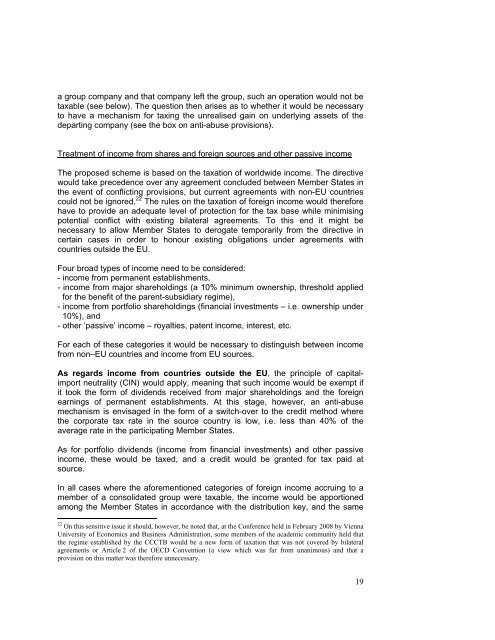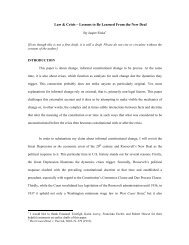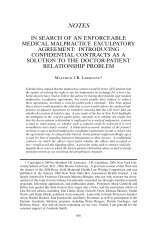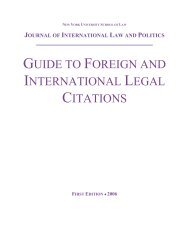An outline of the CCCTB (Common Consolidated Corporate Tax ...
An outline of the CCCTB (Common Consolidated Corporate Tax ...
An outline of the CCCTB (Common Consolidated Corporate Tax ...
You also want an ePaper? Increase the reach of your titles
YUMPU automatically turns print PDFs into web optimized ePapers that Google loves.
a group company and that company left <strong>the</strong> group, such an operation would not be<br />
taxable (see below). The question <strong>the</strong>n arises as to whe<strong>the</strong>r it would be necessary<br />
to have a mechanism for taxing <strong>the</strong> unrealised gain on underlying assets <strong>of</strong> <strong>the</strong><br />
departing company (see <strong>the</strong> box on anti-abuse provisions).<br />
Treatment <strong>of</strong> income from shares and foreign sources and o<strong>the</strong>r passive income<br />
The proposed scheme is based on <strong>the</strong> taxation <strong>of</strong> worldwide income. The directive<br />
would take precedence over any agreement concluded between Member States in<br />
<strong>the</strong> event <strong>of</strong> conflicting provisions, but current agreements with non-EU countries<br />
could not be ignored. 22 The rules on <strong>the</strong> taxation <strong>of</strong> foreign income would <strong>the</strong>refore<br />
have to provide an adequate level <strong>of</strong> protection for <strong>the</strong> tax base while minimising<br />
potential conflict with existing bilateral agreements. To this end it might be<br />
necessary to allow Member States to derogate temporarily from <strong>the</strong> directive in<br />
certain cases in order to honour existing obligations under agreements with<br />
countries outside <strong>the</strong> EU.<br />
Four broad types <strong>of</strong> income need to be considered:<br />
- income from permanent establishments,<br />
- income from major shareholdings (a 10% minimum ownership, threshold applied<br />
for <strong>the</strong> benefit <strong>of</strong> <strong>the</strong> parent-subsidiary regime),<br />
- income from portfolio shareholdings (financial investments – i.e. ownership under<br />
10%), and<br />
- o<strong>the</strong>r ‘passive’ income – royalties, patent income, interest, etc.<br />
For each <strong>of</strong> <strong>the</strong>se categories it would be necessary to distinguish between income<br />
from non–EU countries and income from EU sources.<br />
As regards income from countries outside <strong>the</strong> EU, <strong>the</strong> principle <strong>of</strong> capitalimport<br />
neutrality (CIN) would apply, meaning that such income would be exempt if<br />
it took <strong>the</strong> form <strong>of</strong> dividends received from major shareholdings and <strong>the</strong> foreign<br />
earnings <strong>of</strong> permanent establishments. At this stage, however, an anti-abuse<br />
mechanism is envisaged in <strong>the</strong> form <strong>of</strong> a switch-over to <strong>the</strong> credit method where<br />
<strong>the</strong> corporate tax rate in <strong>the</strong> source country is low, i.e. less than 40% <strong>of</strong> <strong>the</strong><br />
average rate in <strong>the</strong> participating Member States.<br />
As for portfolio dividends (income from financial investments) and o<strong>the</strong>r passive<br />
income, <strong>the</strong>se would be taxed, and a credit would be granted for tax paid at<br />
source.<br />
In all cases where <strong>the</strong> aforementioned categories <strong>of</strong> foreign income accruing to a<br />
member <strong>of</strong> a consolidated group were taxable, <strong>the</strong> income would be apportioned<br />
among <strong>the</strong> Member States in accordance with <strong>the</strong> distribution key, and <strong>the</strong> same<br />
22 On this sensitive issue it should, however, be noted that, at <strong>the</strong> Conference held in February 2008 by Vienna<br />
University <strong>of</strong> Economics and Business Administration, some members <strong>of</strong> <strong>the</strong> academic community held that<br />
<strong>the</strong> regime established by <strong>the</strong> <strong>CCCTB</strong> would be a new form <strong>of</strong> taxation that was not covered by bilateral<br />
agreements or Article 2 <strong>of</strong> <strong>the</strong> OECD Convention (a view which was far from unanimous) and that a<br />
provision on this matter was <strong>the</strong>refore unnecessary.<br />
19
















